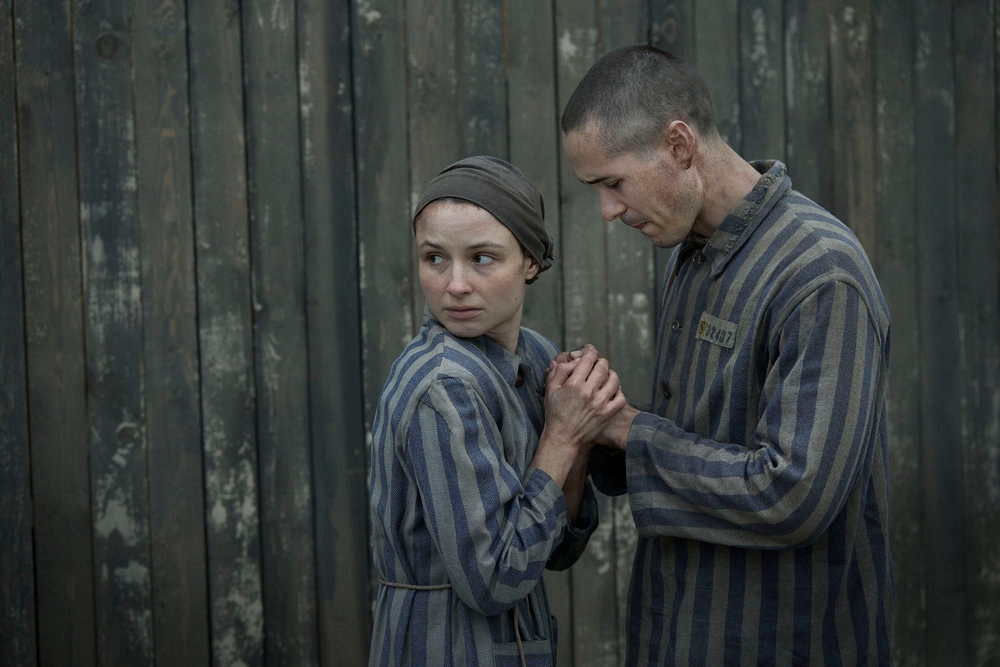Hitler’s Jewish ‘Sweetheart’ Was A 7-Year Old Girl

Rosa Bernile Nienau and Adolf Hitler pose for a picture on April 20, 1933. It was her seventh birthday and his 44th. Nienau pressed edelweiss flowers and a four-leaf clover onto the photograph. Image by Alexander Historical Auctions/Raymond Press, Courtesy of Alexander Historical Auctions/Raymonds P
Adolf Hitler spent his first birthday as Chancellor of Germany embracing and laughing with a seven-year-old Jewish girl. He called her “sweetheart,” and she called him “Uncle Hitler.”
On April 20, 1933 at the Berghof, Hitler’s residence in the Bavarian Alps, the Nazi leader posed for photos with Rosie Bernile Nienau, whose grandmother was Jewish and who was therefore Jewish under Nazi racial law. As Express reports, Nienau shared the dictator’s birthday, and Hitler’s photographer Heinrich Hoffman took the pictures as part of a propaganda campaign. They were later included in the 1934 book “Youth around Hitler.” After the release of these photos, Nienau became known as “The Führer’s Child.”

Rosa Bernile Nienau and Adolf Hitler pose for a picture on April 20, 1933. It was her seventh birthday and his 44th. Nienau pressed edelweiss flowers and a four-leaf clover onto the photograph. Image by Alexander Historical Auctions/Raymond Press, Courtesy of Alexander Historical Auctions/Raymonds P
But Hitler and Nienau’s relationship was more than a one-off photo op. Hitler appears to have been exceedingly fond of the child, the only daughter of a single mother, Karoline Nienau, even after he heard of her Jewish background.
Hitler and Nienau corresponded after their first encounter and even appear to have met more times in person at the Berghof until Martin Bormann, Hitler’s secretary, learned of Nienau’s heritage in 1938. He then barred her from any further contact with Nazi officials including the leader of the Third Reich.
In his 1955 memoir “Hitler Was My Friend,” Hoffman wrote that he was upset at Bormann’s insistence that he stop publishing photos of Hitler and “his child” and that Hitler challenged Bormann’s injunction to keep Nienau and her mother from him. “There are people who have a true talent for spoiling my every joy,” Hoffman reported Hitler saying.
Hoffman’s photo of Hitler and Nienau’s first meeting on their shared birthday, signed by Hitler in blue ink, sold at auction for $11,520 on November 13 at Alexander Historical Auctions in Chesapeake City, Maryland. The auction house would not name the buyer or seller.
The picture shows Hitler holding the girl by the shoulder with a gentle smile. He appears to be listening to her speak as she faces the camera, looking delighted. Hitler’s handwriting was translated by the Auction House from German as “The dear and considerate Rosa Nienau, Adolf Hitler, Munich, the 16th June 1933.”
The Bundesarchiv, the German federal archive, retains 17 letters from Nienau to Hitler and his aide Wilhelm Bruckner between the years 1935 and 1938.

Hitler and Nienau posed in front of the Bavarian Alps. The two corresponded for years after taking this 1933 photo. Image by Alexander Historical Auctions/Raymonds P
The signed photo was sold as part of a lot alongside a first edition copy of Heinrich Hoffman’s memoir, which includes additional photos of Hitler and Nienau.
One such photo shows Nienau and Hitler smiling as they walk hand-in-hand at Hitler’s Bavarian hideaway. For it, Hoffman wrote the caption “Hitler’s Sweetheart — it delighted him to see her at the Berghof until some busybody found she was not of pure Aryan descent.”

Nienau and Hitler in an image from Hoffman’s memoir “Hitler Was my Friend.” The caption reads “‘Hitler’s Sweetheart’ — it delighted him to see her at the Berghof until some busybody found she was not of pure Aryan descent.” Image by Alexander Historical Auctions/Raymond Press
In October 1943, five years after Hitler and Nienau’s contact was discontinued, she died of spinal polio in Munich. She was 17 years old. Despite her Jewish background, she appeared to have never deported to a concentration camp. Her mother survived the war and died in 1962.
PJ Grisar is the Forward’s culture intern. He can be reached at [email protected]

I hope you appreciated this article. Before you go, I’d like to ask you to please support the Forward’s award-winning journalism this Passover.
In this age of misinformation, our work is needed like never before. We report on the news that matters most to American Jews, driven by truth, not ideology.
At a time when newsrooms are closing or cutting back, the Forward has removed its paywall. That means for the first time in our 126-year history, Forward journalism is free to everyone, everywhere. With an ongoing war, rising antisemitism, and a flood of disinformation that may affect the upcoming election, we believe that free and open access to Jewish journalism is imperative.
Readers like you make it all possible. Right now, we’re in the middle of our Passover Pledge Drive and we still need 300 people to step up and make a gift to sustain our trustworthy, independent journalism.
Make a gift of any size and become a Forward member today. You’ll support our mission to tell the American Jewish story fully and fairly.
— Rachel Fishman Feddersen, Publisher and CEO
Join our mission to tell the Jewish story fully and fairly.
Only 300 more gifts needed by April 30

























